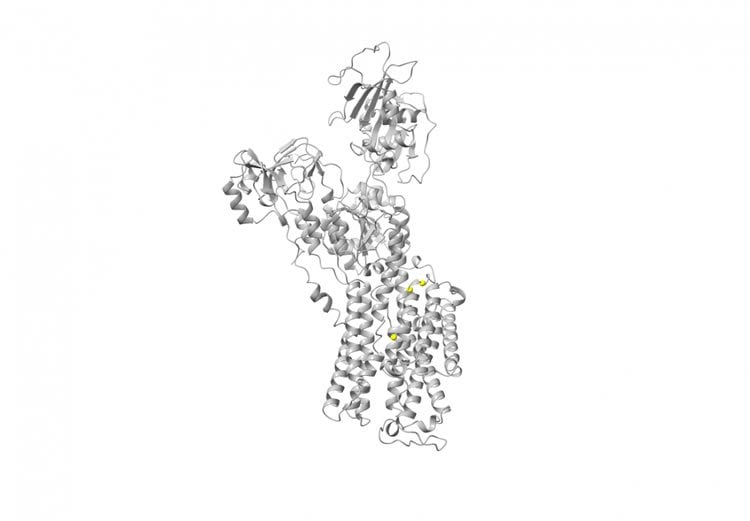Summary: Researchers have identified gene mutations responsible for childhood onset schizophrenia.
Source: McGill University.
Scientists at the Montreal Neurological Institute and Hospital (The Neuro) and McGill University have identified novel genes associated with a specific form of schizophrenia.
Schizophrenia is a major psychiatric illness affecting one per cent of the population worldwide. Patients suffering from schizophrenia present delusions, hallucinations, abnormal behavior, impairment in daily life and cognitive deficits. Current treatments are insufficient in addressing all of these symptoms.
The heritability of schizophrenia is estimated at 80 per cent, but the identification of genes associated with this illness has been challenging.
To identify new genetic variants of this disorder, scientists believed that exploring an extreme and severe form would be helpful, so they chose to focus on childhood-onset schizophrenia, a rare disease with a prevalence of approximately 1 in 40,000. This form has similar symptoms as the adult form, but its onset occurs before the age of 13, and has a very negative outcome. Patients suffering from childhood-onset schizophrenia are generally severely disabled and do not complete a normal school curriculum, nor develop a social life.
A team of researchers recruited and analyzed genetic data from 19 patients with childhood-onset schizophrenia and their unaffected parents. They found that three patients showed a mutation in the ATP1A3 gene while three others showed genetic variants in the FXYD genes, a gene family that contributes to the normal functions of ATP1A3. Mutations affecting ATP1A3 were previously reported in other rare neurological childhood diseases, confirming it has an important role in neurological diseases. This study provides evidence that this gene is also involved in psychiatric disorders.

The identification of genetic variants is the first step forward in efforts to treat childhood-onset schizophrenia. The immediate impact will be to enable diagnosis of patients and provide genetic information to the families. In the future, personalized therapies may follow and some drug interventions might become available for carriers of ATP1A3 mutations.
“Our identification of genes responsible for this terrible condition means researchers can focus on developing drug therapies to give patients better outcomes,” says Dr. Boris Chaumette, a post-doctoral researcher in the lab of Dr. Guy Rouleau at The Neuro, and the study’s first author. “It will also decrease the guilt the children’s parents often feel, because they think they somehow caused their child’s condition.”
This work, conducted in collaboration with scientists from France (Department of Child and Adolescent Psychiatry in Rouen University Hospital and Pitié-Salpêtrière Hospital in Paris) and the United States (National Institutes of Health), was published in the journal Molecular Psychiatry on June 12, 2018.
Funding: The study was funded by Genome Canada and Genome Quebec and supported by the Canadian Institutes for Health Research (CIHR) and the Healthy Brain for Healthy Lives – McGill University initiative.
Source: McGill University
Publisher: Organized by NeuroscienceNews.com.
Image Source: NeuroscienceNews.com image is adapted from the McGill news release.
Original Research: Abstract for “Missense variants in ATP1A3 and FXYD gene family are associated with childhood-onset schizophrenia” by Boris Chaumette, Vladimir Ferrafiat, Amirthagowri Ambalavanan, Alice Goldenberg, Alexandre Dionne-Laporte, Dan Spiegelman, Patrick A. Dion, Priscille Gerardin, Claudine Laurent, David Cohen, Judith Rapoport & Guy A. Rouleau in Molecular Psychiatry. Published June 12 2018
doi:10.1038/s41380-018-0103-8
[cbtabs][cbtab title=”MLA”]McGill University “Genes Associated with Infantile Forms of Schizophrenia Identified.” NeuroscienceNews. NeuroscienceNews, 19 June 2018.
<https://neurosciencenews.com/infantile-schizophrenia-genetics-9387/>.[/cbtab][cbtab title=”APA”]McGill University (2018, June 19). Genes Associated with Infantile Forms of Schizophrenia Identified. NeuroscienceNews. Retrieved June 19, 2018 from https://neurosciencenews.com/infantile-schizophrenia-genetics-9387/[/cbtab][cbtab title=”Chicago”]McGill University “Genes Associated with Infantile Forms of Schizophrenia Identified.” https://neurosciencenews.com/infantile-schizophrenia-genetics-9387/ (accessed June 19, 2018).[/cbtab][/cbtabs]
Abstract
Missense variants in ATP1A3 and FXYD gene family are associated with childhood-onset schizophrenia
Childhood-onset schizophrenia (COS) is a rare and severe form of schizophrenia defined as onset before age of 13. Here we report on two unrelated cases diagnosed with both COS and alternating hemiplegia of childhood (AHC), and for whom two distinct pathogenic de novo variants were identified in the ATP1A3 gene. ATP1A3 encodes the α-subunit of a neuron-specific ATP-dependent transmembrane sodium–potassium pump. Using whole exome sequencing data derived from a cohort of 17 unrelated COS cases, we also examined ATP1A3 and all of its interactors known to be expressed in the brain to establish if variants could be identified. This led to the identification of a third case with a possibly damaging missense mutation in ATP1A3 and three others cases with predicted pathogenic missense variants in the FXYD gene family (FXYD1, FXYD6, and FXYD6-FXYD2 readthrough). FXYD genes encode proteins that modulate the ATP-dependant pump function. This report is the first to identify variants in the same pathway for COS. Our COS study illustrates the interest of stratifying a complex condition according to the age of onset for the identification of deleterious variants. Whereas ATP1A3 is a replicated gene in rare neuropediatric diseases, this gene has previously been linked with COS in only one case report. The association with rare variants in FXYD gene family is novel and highlights the interest of exploring these genes in COS as well as in pediatric neurodevelopmental disorders.






